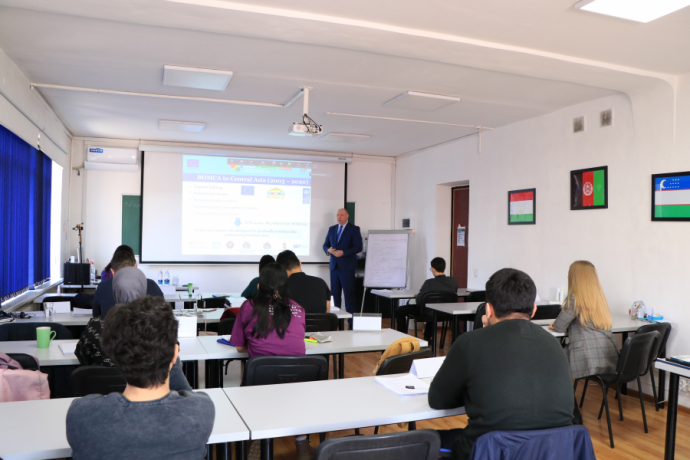News
Regional Manager of Border Management Programme in Central Asia delivered a lecture at the OSCE Academy
On 7 of March 2022, Mr. Maris Domins, Colonel, Regional Manager of Border Management Programme in Central Asia, Phase 10 (BOMCA10), delivered the lecture ‘Effective border and migration management as important aspect for public safety and regional development in Central Asia’ at the OSCE Academy in Bishkek. This lecture was a part of the course ‘Contemporary Security Issues’ taught by Dr Elena Zhirukhina within MA Programme in Politics and Security.
BOMCA10, started back in April 2021, builds on experience of a continuous work in Central Asia since 2003, explained Mr. Domins. Over years, BOMCA has developed into the EU’s largest capacity building programme in the region. In its tenth phase, BOMCA aims to enhance security, stability, and sustainable growth in Central Asia, as well to support cross-border cooperation. No less important is to address living conditions of communities residing in border areas of Central Asia.
To do so, BOMCA10 employs a broad range of instruments. These include various consultancies, technical assistance, workshops and seminars, trainings of trainers, exchange of trainers, study visits, distance and e-learning, as well as provision of special equipment among other tools.
Mr. Domins noted that it is very important to think of borders not only in terms of division, security, and control but also in terms of multi-beneficial cross-border cooperation; and a good border management model provides for legal, secure, safe, and efficient flow of people and goods. Hence, BOMCA10 has four major components to meet its objectives. First, the institutional development of border control agencies focuses on replicating international standards in strategic and operational activities of responsible agencies and on implementing best practices of EU integrated border management (IBM) model, where appropriate. Second, the improvement of detection capacities aims at supporting responsible institutions in conducting effective evidence-based investigations of cross-border crimes. Third, the facilitation of trade deals with furthering economic integration processes by harmonizing institutional, technical, and normative practices to ensure smooth movements of people and cargo across the borders. Forth, the improvement of cross-border cooperation targets border communities by improving living conditions in border areas through local economic development, paying close attention to human rights and gender equality.
Further, Mr. Domins emphasized the crucial role of partnerships and cooperation in making borders in Central Asia more secure. Mapping key stakeholders and their activities proves helpful in avoiding duplication of projects and leads to exchange of expertise and creation of joint initiatives. BOMCA invests in strengthening partnerships with a number of international stakeholders including Frontex – the EU Border and Coast Guard Agency, the United Nations Office on Drugs and Crime (UNODC), EU – funded project Law Enforcement in Central Asia (LEICA), the International Organization for Migration (IOM), the United Nations High Commissioner for Refugees (UNHCR), Organization for Security and Co-operation in Europe (OSCE) and others.
Geopolitical situation in the Central Asian region continues to be tense after the Taliban takeover in Afghanistan which also places additional pressure on border control capacities. Return of foreign terrorist fighters from Syria and Iraq as well as from other hot spots to Central Asia requires strengthening security measures at borders as well as to develop profiling and identification capabilities. Risk of new border tensions among countries in Central Asia as well as consequences of the COVID-19 pandemic further contribute to the complexity of a security landscape. Hence, Mr. Domins concluded that capacity building, technical assistance efforts and procurement of respective equipment remain critical to support regional beneficiaries such as border agencies, migration authorities, customs, phyto-veto and sanitary agencies, health services as well as law enforcement agencies to face numerous border challenges in Central Asia.



 Русская версия
Русская версия